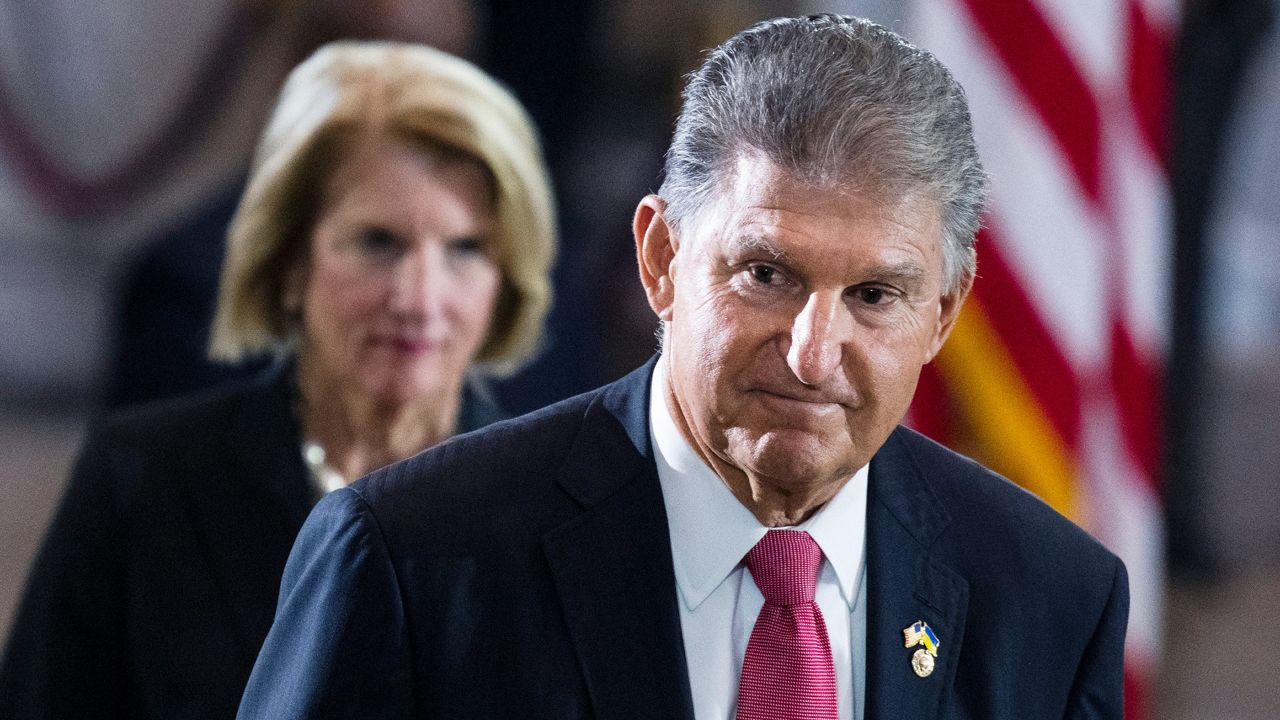Sen. Joe Manchin has said he'll oppose an economic measure he's been negotiating with Democratic leaders if it includes climate or energy provisions or higher taxes on the rich and corporations, a Democrat briefed on the conversations said late Thursday, delivering a stunning blow to one of the party's top election-year priorities.
In response, President Joe Biden urged Democratic leadership to forge ahead on a slimmed-down version of the economic package that aims to lower prescription drug prices and extend Affordable Care Act subsidies.
What You Need To Know
- Sen. Joe Manchin has told Senate Majority Leader Chuck Schumer that he will oppose an economic measure if it includes climate or energy provisions or boosts taxes on the rich or corporations, a Democrat briefed on the conversations said
- In an interview with a West Virginia radio station on Friday, the conservative Democrat said that he's still open to those provisions, but wanted to wait to see how the July inflation figures stack up
- The official says that now, Manchin has told Schumer he will only support a package limited to curbing pharmaceutical prices and extending federal subsidies for buying health care coverage
- In a statement Friday, Biden urged Leader Schumer to move ahead with a measure to lower drug prices and address ACA premiums before August
The official said Manchin told Senate Majority Leader Chuck Schumer, D-N.Y., on Thursday that he will only support a new measure if it is limited to curbing pharmaceutical prices and extending federal subsidies for buying health care coverage. Manchin abruptly derailed his party's bigger and wider-ranging social and environment package last December after months of negotiations and after the measure had already passed the House.
In an interview with a West Virginia radio station on Friday, the conservative Democrat said that he's still open to those provisions, but wanted to wait to see how the July inflation figures stack up.
Manchin told West Virginia MetroNews' Hoppy Kercheval on Friday that such reports "failed to say" that he communicated to Leader Schumer that he was still open to the energy and climate provisions, but wanted to wait and see what happens with next month's inflation figures.
"I said, 'Chuck until we see the July inflation figures ... let's wait until that comes out, so we know that we're going down a path that won't be inflammatory, to add more to inflation,'" Manchin told Kercheval that he communicated to Schumer.
Those figures are set to be released Bureau of Labor Statistics in early August, which sets up a tight timeline for Democrats to get a bill passed through the Senate's reconciliation process.
Manchin said that he communicated to Schumer that if a measure "has to be done in July, the one thing you know you can get done is basically do that bill, write a piece of legislation on reducing drug prices, letting Medicare negotiate."
"That saves about $288 billion over 10 years, take 40 billion of that and extend the Affordable Care Act discounts that people were getting so their premiums won't go up," Manchin told the host.
"And also take the other $240 billion and put it to debt reduction," he continued. "You're serious about inflation, you're reducing debt, you're serious about people paying higher prices for their drugs, and we're doing it by letting Medicare negotiate and staving off the increases that would come if the incentives that we given, or the reductions we gave, for the ACA are not extended for two more years. That's what you can do in this July."
Manchin told the host that addressing inflation is among his top priorities.
"Inflation is absolutely killing many, many people," he said. "They can't buy gasoline, they have a hard time buying groceries, everything they buy and consume for their daily lives is a hardship to them. And can't we wait to make sure that we do nothing to add to that?"
Manchin's demands leave the future of the latest measure unclear, seemingly upending the hopes of President Biden and Democratic leaders' for a more sweeping package they could push through Congress by August. That would have let them show Democratic voters that they were addressing a range of party priorities like curbing climate change and taxing the rich and draw a contrast with Republicans, who are expected to oppose the legislation unanimously.
In a statement Friday, President Biden praised Schumer for his hard work in negotiating on the bill, but urged the Majority Leader to move ahead with a measure to lower drug prices and address ACA premiums before August.
"After decades of fierce opposition from powerful special interests, Democrats have come together, beaten back the pharmaceutical industry and are prepared to give Medicare the power to negotiate lower drug prices and to prevent an increase in health insurance premiums for millions of families with coverage under the Affordable Care Act," Biden said. "Families all over the nation will sleep easier if Congress takes this action. The Senate should move forward, pass it before the August recess, and get it to my desk so I can sign it."
"This will not only lower the cost of prescription drugs and health care for families, it will reduce the deficit and help fight inflation," he said, adding: "Congress must act quickly and get legislation to my desk to deliver for American families."
The president also pledged that he will "take strong executive action to meet this moment" to address the climate crisis. "Action on climate change and clean energy remains more urgent than ever."
"My actions will create jobs, improve our energy security, bolster domestic manufacturing and supply chains, protect us from oil and gas price hikes in the future, and address climate change," Biden said. "I will not back down: the opportunity to create jobs and build a clean energy future is too important to relent."
Manchin said Friday that he's still supportive of the tax provisions, but wants to make sure that it does not have a negative impact on the economy.
"I want people to pay their fair share, I think corporations should pay their fair share," he told the radio host. "But I've got to be careful that corporations aren't basically stymied to where they won't invest, they won't hire, they start laying off, I want to make sure none of that can happen."
However, containing the costs of prescription drugs and extending subsidies for people buying health insurance under former President Barack Obama's 2010 health care law are also top Democratic priorities. Manchin's stance puts his party in the position of having to decide whether it should reluctantly declare victory by solely addressing some of its health care goals, as opposed to demanding more but potentially ending up with nothing.
Democrats' $2 trillion package that collapsed last year included similar restrictions on prescription drug prices estimated to cost $297 billion over a decade. It also would have temporarily extended subsidies for buying health coverage — which expire in January — with a price tag of around $74 billion.
Manchin spokesperson Sam Runyon issued a statement that reiterated the senator's assertions that he did not want any measure that emerged to worsen inflation. The government reported this week that consumer costs last month grew by an annual level of 9.1%, the highest figure in four decades.
"Political headlines are of no value to the millions of Americans struggling to afford groceries and gas as inflation soars to 9.1%," Runyon said. "Senator Manchin believes it's time for leaders to put political agendas aside, reevaluate and adjust to the economic realities the country faces to avoid taking steps that add fuel to the inflation fire."
Manchin signaled unease with the negotiations on Wednesday, saying the latest inflation figures left him feeling "more cautious than I've ever been" about agreeing to a package that could fuel further price increases.
The official who described the talks was not authorized to discuss the negotiations publicly and spoke on condition of anonymity.
Biden and congressional Democrats have been hoping to enact a roughly $1 trillion version of the $2 trillion bill that Manchin killed in December and tout it as an achievement before the November elections. Republicans, who hope to capture House and Senate control in the fall voting, say the new measure would worsen inflation by boosting spending and raising taxes.
Manchin, one of Congress' more centrist Democrats, has enormous leverage, much to the dismay of many in his party. Using special budget rules, Democrats can push a package through the 50-50 Senate if they are solidly united, along with Vice President Kamala Harris' tie-breaking vote.
They also control the House, though narrowly. Recent grumbling from some moderates there about raising taxes — an easy campaign-season target for Republicans — has raised questions about the fate of tax boost proposals in that chamber.
Top Democrats have wanted to reach agreement and approve the measure before Congress begins its August recess. Progress on major legislation is much harder in the autumn of election years, when every vote can become the target of a barrage of campaign attack ads.
White House spokesman Nick Conger declined to comment on Manchin's position.
Senate Finance Committee Chairman Ron Wyden, D-Ore., called Democrats' legislation "our last chance to prevent the most catastrophic-and costly-effects of climate change." But he said the party must "salvage as much of this package as possible. The expression that failure is not an option is overused, but failure really is not an option here."
"It seems odd that Sen. Manchin would choose as his legacy to be the one man who single-handedly doomed humanity. But we can't throw in the towel on the planet," said John Podesta, founder of the liberal Center for American Progress, who said Biden should use his executive powers to take climate action.
Brett Hartl, government affairs director at the Center for Biological Diversity, called it "outrageous that Manchin and the Republican Party have killed climate legislation this Congress," and called on Biden to take action.
In talks with Schumer that have lasted months, Manchin had previously expressed support for energy and climate language and for raising levies on high-earners and big companies.
Just this week, two Democratic aides said bargainers were planning to include a proposal to extend the solvency of Medicare for three more years by applying an existing 3.8% tax on high earners to many people who earn income from some tax-advantaged business entities. Asked about that, Runyon said Manchin has always supported keeping Medicare solvent and reducing pharmaceutical costs.
According to the official, Schumer had told Manchin during their talks that he would support using half of the overall measure for deficit reduction, a Manchin demand.
Schumer also said he would back setting aside $375 billion for climate and energy provisions, the official said. He also told Manchin he would back provisions aimed at helping domestic energy drilling — the West Virginian is a strong supporter of coal and domestic oil production — and would not include tax credits for electric vehicles, which Manchin had largely opposed.
The official said that even so, the resulting measure would have included clean energy tax credits and trimmed carbon emissions by almost 40 percent by 2030, according to Democratic estimates.








